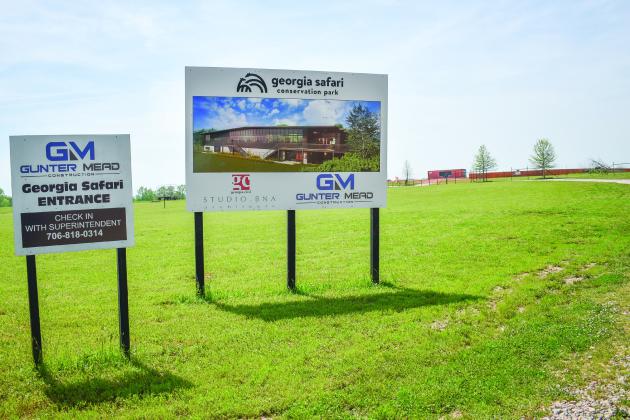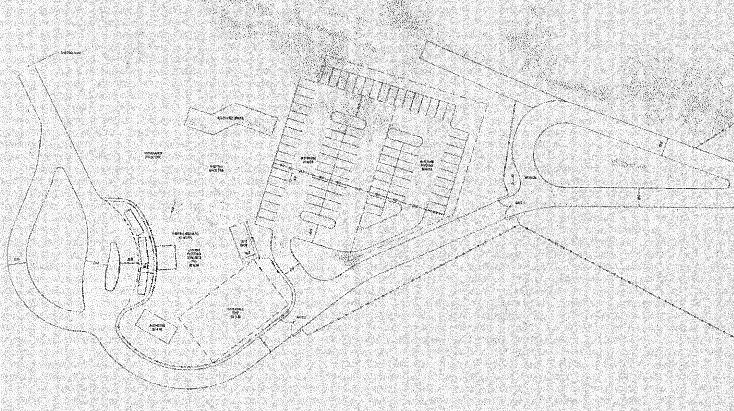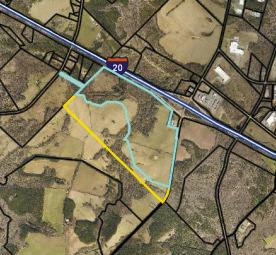Temporary entrance to be built
The proposed Georgia Conservation Safari Park, which has wound its way through red tape and delays for the past decade, took another step toward becoming a reality recently.
During its April 8 meeting, the Madison City Council approved a zoning map amendment that moves property from Light Industrial/Manufacturing District (I2) to Agricultural/ Single Family District (AR) will allow the park’s developers to proceed with a temporary entrance and public tour origination and termination point.
Mike Conrads, who has been the driving force behind the park since it was first proposed more than a decade ago, said the zoning change will allow construction of a 2,000-square-foot building, as well as a 600-square-foot concrete pad, a 200-square-foot landscaped area, a 7,200-square-foot gravel parking area with 40 parking spaces and two concrete handicapped parking spaces, and a 1,200-square-foot gravel truck “turnaround.”
Molly Bogle of Madison’s planning staff had previously presented a zoning report to the city’s Planning and Zoning Commission, and the board approved the request by a 5-0 vote.
The property is an approximately 194-acre lot “located between Interstate 20 (I-20) to the north, Monticello Highway (Georgia State Route 83 [SR 83]) to the east, parcel 037D 014 ZA to the south and Clack Road to the west,” according to Madison’s staff report.
Staff also concluded that the zoning proposal is mostly consistent with the city’s Comprehensive Plan, which encourages the development or expansion of businesses and industries that are suitable to the community.
“Factors to consider when determining suitability include job skills required; long-term sustainability; linkages to other economic activities in the region; impact on the resources of the area; or prospects for creating job opportunities that meet the needs of a diverse local workforce,” according to the plan.
Conrads said he may request another zoning change for the property once construction of the park moves into its next phase to create an area for retail and commercial activities related to the park.
The City Council also approved a contract to have TSW create a transportation plan for $74,960.
According to city documents, the project will be “crafted to develop a plan rooted in engagement from the public and stakeholders, enabling input and review across all project phases.”
The plan calls for an “existing conditions assessment” to gather data, assess field conditions, review past plans, and conduct preliminary spatial analysis.
The TSW team plans to organize a driving tour of key roads and destination points in the city as well as walking and biking tours of downtown Madison and neighborhood streets.
Current and future year traffic capacities for major corridors and intersections and peak congestion areas will be analyzed, along with data concerning population density, income, car ownership, and the number of children in each household.
An emphasis will be placed on public engagement. Councilmen Eric Joyce and Ed Latham were both pleased with that aspect of the new plan.
“Effective public and stakeholder engagement is vital to the success of this project. TSW will work with the City of Madison to create and tailor a community participation plan to best engage many different voices and perspectives. Our program will emphasize meeting the community where they are, including tabling at community events, conducting outreach at popular gathering spaces, and using technology-enabled methods,” according to TSW’s project plans.
Later in the meeting, former Madison Councilman Joe Diletto questioned the need for a new survey and indicated that many such studies had been done in the past with limited results.
“It can be done better, but we’re not using the resources that we have,” Diletto said. “I don’t think a $75,000 traffic survey needs to be done.”



